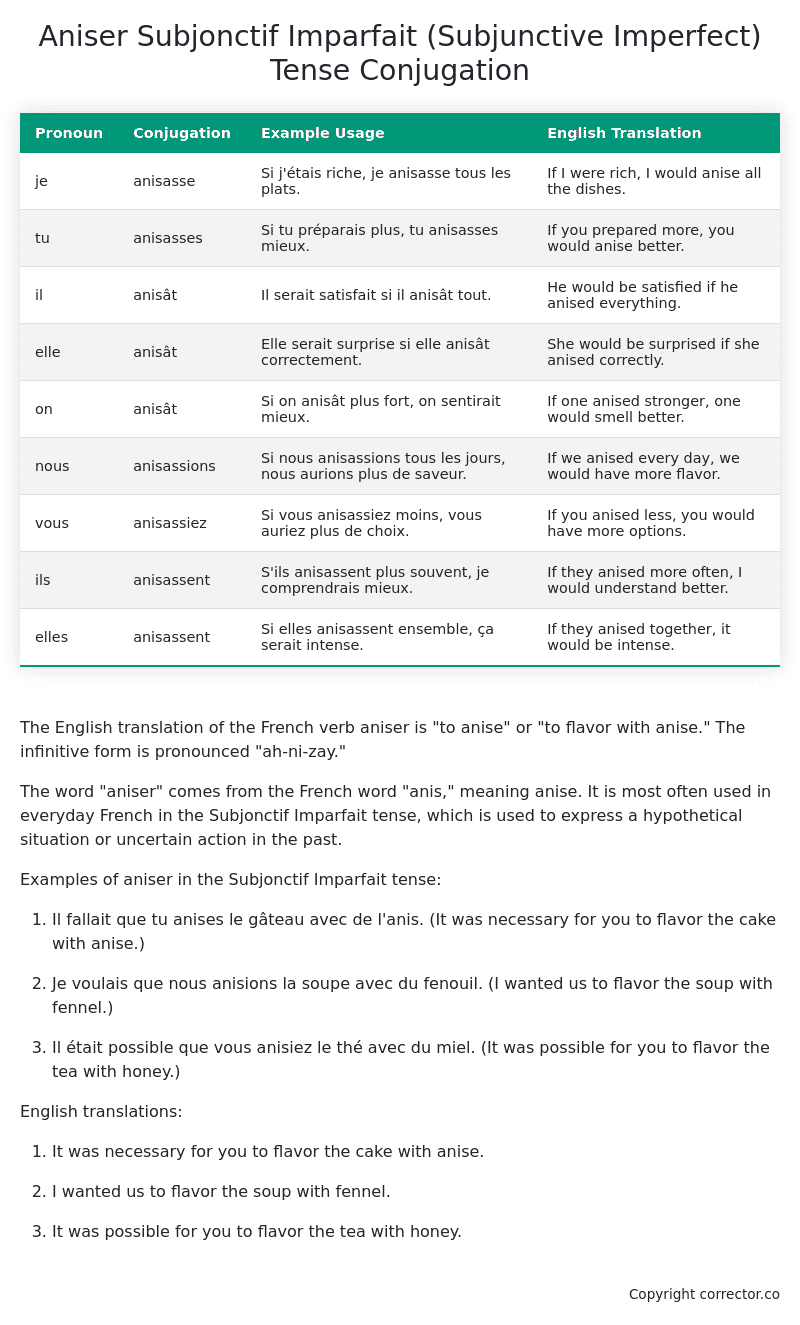Subjonctif Imparfait (Subjunctive Imperfect) Tense Conjugation of the French Verb aniser
Introduction to the verb aniser
The English translation of the French verb aniser is “to anise” or “to flavor with anise.” The infinitive form is pronounced “ah-ni-zay.”
The word “aniser” comes from the French word “anis,” meaning anise. It is most often used in everyday French in the Subjonctif Imparfait tense, which is used to express a hypothetical situation or uncertain action in the past.
Examples of aniser in the Subjonctif Imparfait tense:
-
Il fallait que tu anises le gâteau avec de l’anis. (It was necessary for you to flavor the cake with anise.)
-
Je voulais que nous anisions la soupe avec du fenouil. (I wanted us to flavor the soup with fennel.)
-
Il était possible que vous anisiez le thé avec du miel. (It was possible for you to flavor the tea with honey.)
English translations:
-
It was necessary for you to flavor the cake with anise.
-
I wanted us to flavor the soup with fennel.
-
It was possible for you to flavor the tea with honey.
Table of the Subjonctif Imparfait (Subjunctive Imperfect) Tense Conjugation of aniser
| Pronoun | Conjugation | Example Usage | English Translation |
|---|---|---|---|
| je | anisasse | Si j’étais riche, je anisasse tous les plats. | If I were rich, I would anise all the dishes. |
| tu | anisasses | Si tu préparais plus, tu anisasses mieux. | If you prepared more, you would anise better. |
| il | anisât | Il serait satisfait si il anisât tout. | He would be satisfied if he anised everything. |
| elle | anisât | Elle serait surprise si elle anisât correctement. | She would be surprised if she anised correctly. |
| on | anisât | Si on anisât plus fort, on sentirait mieux. | If one anised stronger, one would smell better. |
| nous | anisassions | Si nous anisassions tous les jours, nous aurions plus de saveur. | If we anised every day, we would have more flavor. |
| vous | anisassiez | Si vous anisassiez moins, vous auriez plus de choix. | If you anised less, you would have more options. |
| ils | anisassent | S’ils anisassent plus souvent, je comprendrais mieux. | If they anised more often, I would understand better. |
| elles | anisassent | Si elles anisassent ensemble, ça serait intense. | If they anised together, it would be intense. |
Other Conjugations for Aniser.
Le Present (Present Tense) Conjugation of the French Verb aniser
Imparfait (Imperfect) Tense Conjugation of the French Verb aniser
Passé Simple (Simple Past) Tense Conjugation of the French Verb aniser
Passé Composé (Present Perfect) Tense Conjugation of the French Verb aniser
Futur Simple (Simple Future) Tense Conjugation of the French Verb aniser
Futur Proche (Near Future) Tense Conjugation of the French Verb aniser
Plus-que-parfait (Pluperfect) Tense Conjugation of the French Verb aniser
Passé Antérieur (Past Anterior) Tense Conjugation of the French Verb aniser
Futur Antérieur (Future Anterior) Tense Conjugation of the French Verb aniser
Subjonctif Présent (Subjunctive Present) Tense Conjugation of the French Verb aniser
Subjonctif Passé (Subjunctive Past) Tense Conjugation of the French Verb aniser
Subjonctif Imparfait (Subjunctive Imperfect) Tense Conjugation of the French Verb aniser (this article)
Subjonctif Plus-que-parfait (Subjunctive Pluperfect) Tense Conjugation of the French Verb aniser
Conditionnel Présent (Conditional Present) Tense Conjugation of the French Verb aniser
Conditionnel Passé (Conditional Past) Tense Conjugation of the French Verb aniser
L’impératif Présent (Imperative Present) Tense Conjugation of the French Verb aniser
L’infinitif Présent (Infinitive Present) Tense Conjugation of the French Verb aniser
Struggling with French verbs or the language in general? Why not use our free French Grammar Checker – no registration required!
Get a FREE Download Study Sheet of this Conjugation 🔥
Simply right click the image below, click “save image” and get your free reference for the aniser Subjonctif Imparfait tense conjugation!

Aniser – About the French Subjonctif Imparfait (Subjunctive Imperfect) Tense
Formation
Common Everyday Usage Patterns
Interactions with Other Tenses
Subjonctif Présent
Indicatif Passé Composé
Conditional
Conditional Perfect
Summary
I hope you enjoyed this article on the verb aniser. Still in a learning mood? Check out another TOTALLY random French verb conjugation!


